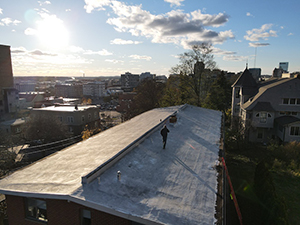
Commercial buildings in Franklin OH rely heavily on strong and well-maintained roofing systems to protect investments and daily operations. A commercial roof inspection is an essential service that provides property owners and managers with an accurate understanding of the condition of their roof. Inspections can identify issues early, prevent severe damage, and extend the life of the entire roofing system. Understanding how these inspections work and why they matter is key to ensuring the long-term protection of your property. If you need a commercial roof inspection in the Franklin, OH area call A.H. Sturgill Roofing on (937) 254-2955.
Why Commercial Roof Inspections Matter
A commercial roof serves as the first line of defense against rain, wind, snow, and fluctuating temperatures. Even minor damage can compromise the performance of the entire system. Routine roof inspections allow professionals to evaluate every aspect of the structure and identify small concerns before they develop into serious problems.
Commercial roof inspections also help maintain compliance with safety standards and building regulations. In areas like Franklin OH, where weather conditions can be unpredictable, this service becomes even more valuable. From heavy rains to freezing winters, roofs are exposed to elements that gradually wear down materials. An inspection ensures that the roof is prepared to manage these challenges.
What Professionals Check During an Inspection

When a roofing professional inspects a commercial roof, the process involves more than a quick glance at the surface. They will carefully examine flashing, seams, drainage systems, and the integrity of the roof membrane. The condition of gutters and downspouts is also reviewed to ensure proper water flow. Standing water, punctures, and loose materials are other issues that are identified.
Benefits of Routine Roof Inspections
The benefits of routine roof inspections extend beyond spotting visible damage. They provide property owners with documentation that proves the roof has been regularly maintained. This can be particularly important when filing insurance claims after storms or other unexpected events. Inspections also support better financial planning. By understanding the current condition of the roof, owners can anticipate when repairs or replacements may be necessary. Rather than being caught off guard by sudden problems, inspections make it possible to prepare for and address issues in a timely manner.
Protecting Your Investment
By committing to regular inspections, property owners in Franklin OH safeguard not only their physical building but also the people and assets inside. It is an initiative-taking step that provides peace of mind and ensures long term stability.
Routine Commercial Roof Inspection
While it is wise to schedule a commercial roof inspection annually, there are specific times when an inspection is especially important. After severe weather events such as strong storms or heavy snowfall, inspections help identify potential damage quickly. They are also recommended before purchasing or leasing a property to ensure the roof is in acceptable condition. Seasonal changes are another enjoyable time to call for professional assessment. Preparing the roof before winter or summer ensures that it can manage temperature extremes without unnecessary wear. If you are in Franklin, OH contact A.H. Sturgill Roofing on (937) 254-2955 for a commercial roof inspection.
FAQ
What is a visual inspection?
A visual inspection is a surface level check of obvious problems, while a detailed assessment involves a comprehensive review that may include advanced tools like infrared scanning to uncover hidden issues.
How long does a typical commercial roof inspection take?
The length of time depends on the size and complexity of the roof. Smaller buildings may take an hour or two, while larger structures could require half a day or more for a complete inspection.
Can an inspection identify structural issues beneath the roof surface?
Yes, in many cases inspections reveal signs of structural concerns such as sagging, moisture damage, or weakened support materials. Professional inspectors are trained to recognize these warning signs and recommend further evaluation if needed.